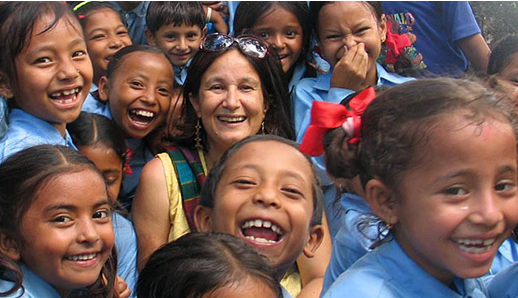More Than Just a Soccer Tournament for Bhutanese Refugees
The 2nd Annual Bhutanese Interstate Soccer Tournament was hosted at Oakland Technical High School this past weekend, and it was an excellent weekend indeed for the entire Bay Area Bhutanese community. Thirteen Bhutanese teams flew and drove in from Idaho, Colorado, Texas, Oregon, Washington, Tennessee, Arizona and Georgia to compete to win the National Championship.
Soccer in the United States doesn't always get the glory that our beloved football and baseball get, but around the world, soccer ( or as the world calls it, football) is an extremely popular sport that draws billions of impassioned fans, so while we may not think that this soccer tournament would be a big deal, let's take a closer look at why it was.
Although historically a peaceful country, in the '80s and '90s religious infighting in Bhutan caused the government to oust nearly a fifth of the population from their South Asian home, taking away their citizenship and forcing them to go to refugee camps in neighboring Nepal. Slowly, these refugees have been resettled, may of them in pockets of the U.S. In Oakland, you will find scattered neighborhoods of Bhutanese refugees who have been systematically relocated by the UNHCR. Many haven't seen their native Bhutan since the 1990s.
As you can imagine, with the unsettled and dangerous lives many of these refugees have led, a common interest in soccer has helped to give them some joy and passion in their day-to-day lives. They held their first U.S. tournament in Georgia last year. The California team drove across the country tandem in 15 passenger vans, stopping along the way to play music, cook and eat their rice, vegetable curry and lentils. Sounds like Curry Without Worry to me.
After coming in third place last year, the Californian Bhutanese refugee team offered to host the tournament this year. The traveling teams all got to enjoy a taste of the wonderful weather and generous hospitality at the three-day tournament. In many ways the weekend served as a reunion for old friends. There are seven refugee camps in Eastern Nepal. The youth that grew up together in the camps and were neighbors for years did not necessarily relocate to the same areas of the United States. While families often did stay together, friends were dispersed when the relocation to the U.S. took place. In addition, many of the Bay Area's original Bhutanese refugees have left the area because of the high cost of living and high unemployment rate here. So this tournament was not just a soccer game, but a time for old friends who had been through a harrowing experience together to reconnect under joyful circumstances in their new country.
The Bhutanese Community in California organized this year's tournament. A group of about ten community leaders and soccer players started the planning and fundraising several months ago. These are ordinary guys who have made a way for their families and a new life in America through hourly wage jobs at airport shuttle services, laundromats and thrift stores. They were aided by the support of two charitable organizations: Ethne Global Services (Ethne) and Soccer Without Borders.
Ethne was founded in 2010 when a group of people realized that the governmental services offered to the refugee populations in the U.S. tended to be short-lived, lasting only 4-12 months after their arrival. Ethne now offers an ESL class, family mentoring opportunities, and a knitting micro-enterprise for women called Himalayas by Hand. At the soccer tournament, Ethne volunteers helped with food preparation, planning of the event, refereeing, transportation and photography.
Soccer without Borders helped book the soccer field where their own youth teams normally practice. A few men from the Bhutanese community cooked daal, curry and rice outside the playing field in industrial-kitchen-sized pots to feed all thirteen teams lunch on Saturday and Sunday.
How did it go? Well, the championship match for first and second place was between the Dallas, Texas team and the Fort Worth, Texas team. The game ended in a tie and was determined by penalty kicks. Fort Worth, Texas won and took home the trophy. The third place team was from Idaho.
The team from Dallas plans to host the 3rd Annual tournament next year.
More on the story of Bhutanese Refugees.
More about Ethne Global Services.
Get your next gift here & More about the Himalayas by Hand.
Follow us on Twitter: www.twitter.com/@currywow
 Bhutanese Refugees,
Bhutanese Refugees,  Nepal,
Nepal,  Sports | in
Sports | in  Huffington Post
Huffington Post





